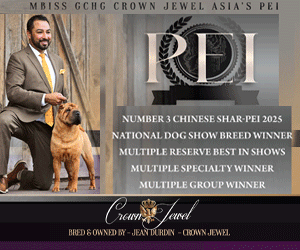We Are The 1%

by Pilar Kuhn
Earlier this year we had a bumper crop of puppies. The week following our litter of Scotties, we found out we would be expecting ten Bouvier puppies. Once our bitch whelped her tenth puppy, we cleaned up the whelping room, my husband returned to the Scottie room, and I stayed on with the baby Bouvs. Exhausted from twelve hours of whelping support, I closed my eyes. And then I heard a new squeak. I had to touch every puppy while counting out loud twice to make sure I wasn’t crazy. Indeed, we had a surprise puppy number eleven, now called Porter.
Porter went to live with a long-time Bouvier owner who works in a vet’s clinic. Less than a week after he went to her home, she texted me, “Porter has a urinary tract infection.” Concerned, we asked for a copy of the culture report for our records. Two weeks of antibiotics later he was doing fine. Then we got another text. “Infection is back. Trying different antibiotic and dosage.” He was, once again, doing fine until shortly after he finished that round. The infection came back again. Something was alarmingly suspect in our surprise puppy. I would wake up at night worrying about him while awaiting more test results.
Two different vet checks and an ultrasound later revealed that Porter had a uracahal remnant. None of my breeding colleagues had ever heard of this, let alone experience it. I pulled out my Merck Pet Health Manual, scoured the index and read the following description:
The urachus is a cord of fibrous tissue that normally extends from the bladder to the navel. Before birth, the urachus is a tube that connects the bladder to the umbilical cord so that wastes can be removed. After birth, it normally closes and becomes a solid cord. In some animals, however, the urachus does not close properly after birth.
Porter’s body was trapping bacteria in this urachal remnant causing the recurring infections. He would have to have surgery to remove the remnant, extra IV fluids to clear out his system and a month’s worth of antibiotics to recover.
I was distraught. I felt guilty for not knowing he had a problem. His owner reassured me it wasn’t our fault. The vet that performed his surgery had a litter of Goldens while in vet school twenty-eight years ago with one puppy at ten days old needing a urachal remnant removed. I asked how she knew that puppy had a urachal remnant and apparently that puppy had been very sickly. The other eight vets at her clinic had never seen this before.
I told my regular vet about Porter’s situation and he reassured me it wasn’t genetic and it wasn’t our fault. I asked him if there was any way we could have known what to look for should it happen again and he said, “Pilar, it’s a situation that affects 1% of all puppies born. It’s so rare. You didn’t do anything wrong.” I sarcastically chirped, “Whoo-hoo! We are the 1%,” before I rolled my eyes. Thankful for our surprise puppy, we could have done without this extra surprise. Porter never showed signs of having any issues. Or did he?
As I thought back over Porter’s first 8 weeks of life, when on the grooming table every week he hunched up a little bit. We started deworming puppies weekly from the time they were five weeks old and several of them would hunch up as the medicine worked its way through. Porter’s hunching stemmed from his urinary tract discomfort, though. Our puppies had antibiotics for two weeks after ear crops, so no wonder we didn’t notice any more hunching or urinary issues before he went home. The antibiotics were killing the infections so he left our home “healthy”, but his body couldn’t stave off infections after the antibiotics left his system.
After a long, but successful surgery, Porter, fast on the mend, has returned to being very active. His vet expects him to make a full recovery and live a lifetime without any more issues of this nature. We’re very thankful Porter ended up in such an observant home. I just wish I had some extra insight to impart about what to look for in future litters, but I don’t. May you never find yourself in this unique group of 1%.

Short URL: http://caninechronicle.com/?p=38636
Comments are closed












